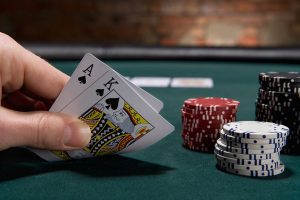
To become a good poker player, you first need to learn to think like one. But ideas are worthless if you don't have the experience and knowledge to talk about them. So the first step is to equip yourself with the language, concepts, and perspective through which advanced poker players see the game.
If you want to be a high-level player, you need to change your perspective. Start looking at the poker game holistically, not simplistically. In other words, you need to see the game as a whole, not dissect it piece by piece.
The best example of this concept is hand analysis. This is the most important step in developing an understanding of the poker game. There are three stages in developing a player's understanding of hands:
- First stage: Hand versus hand
The first stage is the simplest. You choose a hand that you “read” or just guess what the player has and decide what your hand should do against theirs. So, if you have top pair, you try to guess if they might have something better than you and play accordingly. Most beginners think about the poker game this way.
- Second stage: Hand versus hand range
The next stage is to think about how your hand can hold up against the entire range of the opponent's hands in a certain situation. You can think about how your top pair will fare against the opponent's sets, over pairs, top pairs with lower kickers, and possible straight draws, weighing each according to calculated probabilities. The number is only approximate, but you can compare your overall equity against the other player's hands and use that to make decisions. This level of understanding requires feeling the opponent's hand range.
- Third stage: Hand range versus hand range
The third and most complicated stage is to think about how your range of hands fares against the other player's range of hands. This skill requires not only being able to generalize your range but also being able to visualize how you would play with all the other hands you might get in a single deal.
So, how do you get from the first stage to the third? Initially, there is a big gap due to a lack of understanding of values. A beginner needs to evaluate how well their top pair will handle a range where 80% consists of OESD and the other 20% are sets. This is something that is learned over time and with experience. In fact, learning values is quite simple; the more challenging part is managing your mind so you can effectively play the hands you have while maintaining a higher-level poker dynamic in your mind.
 When you are a beginner player, you are simply unable to think about more than one hand at a time. What is in front of you is complicated enough to keep your mind fully occupied. However, as you gain more experience, your mind starts to handle individual hands subconsciously.
When you are a beginner player, you are simply unable to think about more than one hand at a time. What is in front of you is complicated enough to keep your mind fully occupied. However, as you gain more experience, your mind starts to handle individual hands subconsciously.
And once your mind starts to automatically process these individual hands, you will no longer need to put in a lot of effort to unravel things like board combinations or betting patterns for most hands. Your brain will automatically suggest whether to call, fold, or raise, freeing your conscious mind and allowing it to work on higher-level ideas, evaluating the relationships between ranges, card usage, and the flow of the game.
Most people believe that to think about such things while playing, you need to have a high intellect or some special abilities. And that is completely untrue.
The only thing that separates people who can think about these things and those who can't is the amount of experience. Once you have played a million poker hands, your instincts will be so sharp that you will just want to think about more complex actions. Focusing only on individual hands will seem like the biggest waste of time.
So, experience is the key thing. Gather as much experience as possible. And once you have accumulated enough, you will allow your mind to think about holistic ideas during the game.





